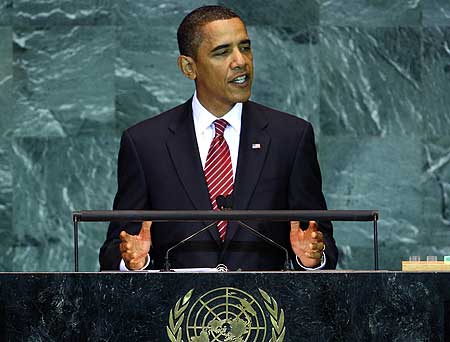UPDATES
Obama’s notable UN speech
September 23, 2011 | Tzvi Fleischer

US President Barack Obama’s UN Speech yesterday was a milestone, in that it included an unusually lucid explanation of Israel’s strategic situation and its right to normal relations with its neighbours. These were the key paragraphs:
Let us be honest with ourselves: Israel is surrounded by neighbours that have waged repeated wars against it. Israel’s citizens have been killed by rockets fired at their houses and suicide bombs on their buses. Israel’s children come of age knowing that throughout the region, other children are taught to hate them. Israel, a small country of less than eight million people, looks out at a world where leaders of much larger nations threaten to wipe it off of the map. The Jewish people carry the burden of centuries of exile and persecution, and fresh memories of knowing that six million people were killed simply because of who they are. Those are facts. They cannot be denied.
The Jewish people have forged a successful state in their historic homeland. Israel deserves recognition. It deserves normal relations with its neighbors. And friends of the Palestinians do them no favours by ignoring this truth, just as friends of Israel must recognize the need to pursue a two-state solution with a secure Israel next to an independent Palestine.
Obama also did a pretty solid job of explaining why the Palestinian bid for UN recognition was not the path to a two-state resolution:
One year ago, I stood at this podium and I called for an independent Palestine. I believed then, and I believe now, that the Palestinian people deserve a state of their own. But what I also said is that a genuine peace can only be realized between the Israelis and the Palestinians themselves. One year later, despite extensive efforts by America and others, the parties have not bridged their differences. Faced with this stalemate, I put forward a new basis for negotiations in May of this year. That basis is clear. It’s well known to all of us here. Israelis must know that any agreement provides assurances for their security. Palestinians deserve to know the territorial basis of their state.
Now, I know that many are frustrated by the lack of progress. I assure you, so am I. But the question isn’t the goal that we seek — the question is how do we reach that goal. And I am convinced that there is no short cut to the end of a conflict that has endured for decades. Peace is hard work. Peace will not come through statements and resolutions at the United Nations — if it were that easy, it would have been accomplished by now. Ultimately, it is the Israelis and the Palestinians who must live side by side. Ultimately, it is the Israelis and the Palestinians — not us — who must reach agreement on the issues that divide them: on borders and on security, on refugees and Jerusalem.
Ultimately, peace depends upon compromise among people who must live together long after our speeches are over, long after our votes have been tallied. That’s the lesson of Northern Ireland, where ancient antagonists bridged their differences. That’s the lesson of Sudan, where a negotiated settlement led to an independent state. And that is and will be the path to a Palestinian state — negotiations between the parties….
That is the truth — each side has legitimate aspirations — and that’s part of what makes peace so hard. And the deadlock will only be broken when each side learns to stand in the other’s shoes; each side can see the world through the other’s eyes. That’s what we should be encouraging. That’s what we should be promoting.
This body — founded, as it was, out of the ashes of war and genocide, dedicated, as it is, to the dignity of every single person — must recognize the reality that is lived by both the Palestinians and the Israelis. The measure of our actions must always be whether they advance the right of Israeli and Palestinian children to live lives of peace and security and dignity and opportunity. And we will only succeed in that effort if we can encourage the parties to sit down, to listen to each other, and to understand each other’s hopes and each other’s fears. That is the project to which America is committed. There are no shortcuts. And that is what the United Nations should be focused on in the weeks and months to come.
Read it all here.
Tzvi Fleischer
Tags: Israel





